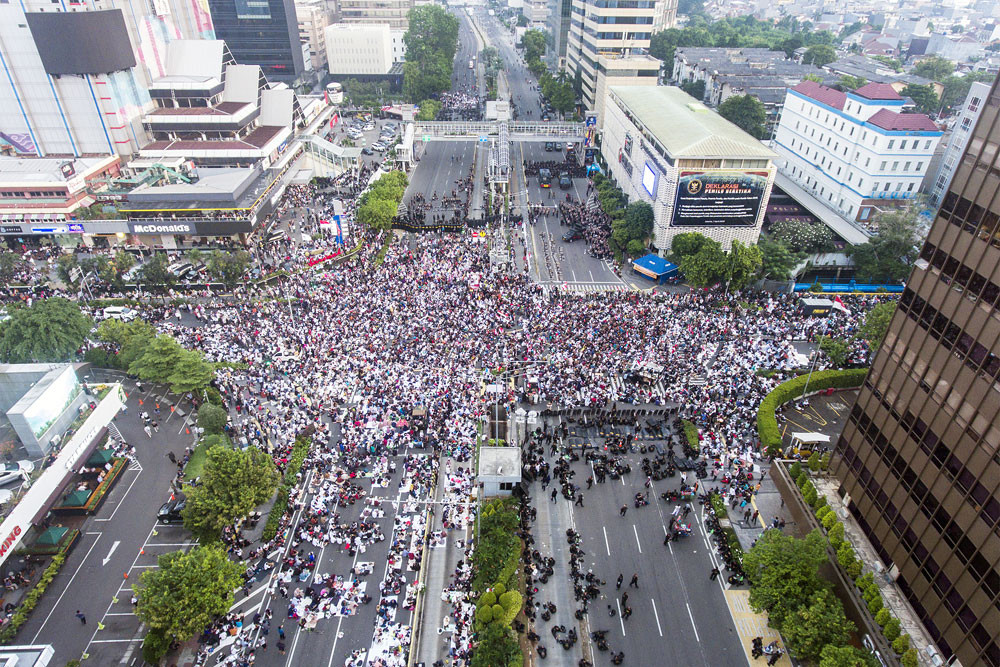Popular Reads
Top Results
Can't find what you're looking for?
View all search resultsPopular Reads
Top Results
Can't find what you're looking for?
View all search resultsPeople power is dead, long live people power
The words “people power” have been thrown around too loosely in the past couple of weeks.These days, people power, street protests and mass gatherings appeared to have lost their magic in forcing change.
Change text size
Gift Premium Articles
to Anyone
T
he words “people power” have been thrown around too loosely in the past couple of weeks. Soon after early vote counts indicated that incumbent President Joko “Jokowi” Widodo would win a second term, supporters of Gerindra Party chairman Prabowo Subianto threatened to unleash street protests to challenge the official vote count conducted by the General Elections Commission (KPU).
National Mandate Party (PAN) cofounder Amien Rais, a devoted backer of Prabowo, was among the first to revive the term “people power” as a means to overturn the 2019 election result.
But as a political science professor and United States-educated scholar, Amien should have known better that people power has gone out of fashion and that it would achieve little in getting the desired outcome of political change. If anything, Amien himself was not so sure about the effectiveness of people power when he called off a planned demonstration at the National Monument (Monas) on May 20, 1998, after hearing that Prabowo, then commander of the Army Strategic Reserve Command (Kostrad), had positioned troops in full battle gear on site.
These days, people power, street protests and mass gatherings appeared to have lost their magic in forcing change. Earlier this month, we saw what looked like the final days of the Nicolas Maduro regime in Venezuela with hundreds of protesters taking to the streets of Caracas.
We saw footage of military barracks being torched and military personnel appearing to be in a state of panic. Two weeks later, Maduro is still in power and there seems to be no end in sight for his regime.
In France, Yellow Vest protesters have occupied the main streets of Paris every weekend for the past six months, wreaking havoc and causing serious damage to the country’s economy. In an ironic twist, the protest has only boosted the popularity of President Emmanuel Macron, who has responded to the protests by holding a tour to show off his debating prowess.
In the streets of Khartoum, what looked like a successful popular uprising quickly turned into a farce with the military taking over the country and refusing to strike a deal with the prodemocracy movement in the African nation.
And then of course the granddad of all failures in popular uprisings, the Tiananmen Square protest. The prodemocracy movement not only failed to create changes in China, in fact the protest became the pretext for the communist government to further tighten its control over its body politic. The modern surveillance system currently in place in China mostly operates to make sure that another Tiananmen will not take place.
And in the event people power or popular uprising does manage to bear fruit in the removal of a dictator or a corrupt regime, it works simply from the confluence of so many factors, with division among the ruling elites being the most important.
This may sound like an insult to the 1998 student movement, but the fall of Soeharto was the outcome of a rift within the ruling elite, the upper echelons in the government, who were torn between supporting a corrupt leader whom they could no longer tolerate or joining the nascent prodemocracy movement, which not only charted a new course for the country but also could provide them with an escape plan. Division within the Indonesian Military (TNI), between hardliners who wanted to preserve Soeharto’s rule and some generals who orchestrated the strongman’s departure also played a crucial role. The role of Wiranto, then the military commander in chief, was crucial in allowing student-led protests to take place in many cities.
So, even under an authoritarian regime, people power is a moot point and should only be treated with caution. Just because Filipinos could topple a dictator in a popular uprising does not mean it can take place in other countries under different circumstances.
The place of people power in a democracy should be more problematic, especially if it is aimed at seeking changes in the government. In a democracy, elected leaders have been thoroughly vetted through the election process and all candidates are expected to play by the rules and respect the outcome even if it does not suit their liking. In the event of fraud or manipulation, even the most widespread, the electoral system is equipped with a number of mechanisms to deal with any problems. In the case of Indonesia, the Constitutional Court has the final authority to overturn any election results if evidence is available to prove widespread, structured and systematic voting fraud.
In the past 20 years, we have placed faith in this electoral system and people power should have been rendered irrelevant. People power should not be used as a mechanism to deal with election complaints.
On Wednesday, people took to the streets to demand change in the election result and started wreaking havoc. It certainly was not people power and it will achieve nothing but violence.
It is a stain on our hard-won democracy.










